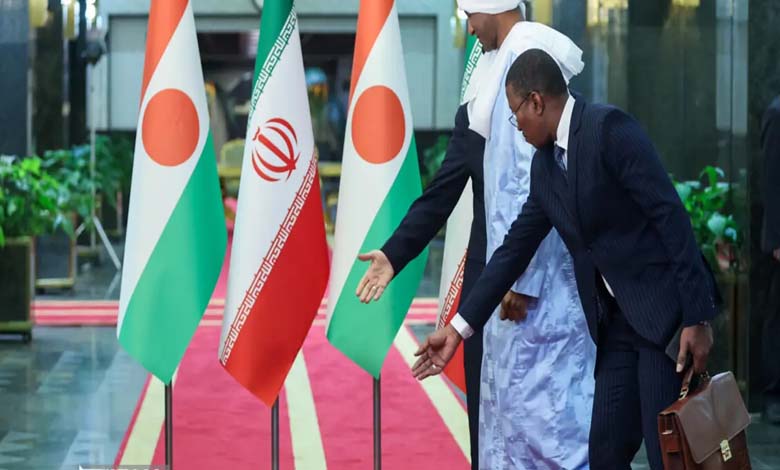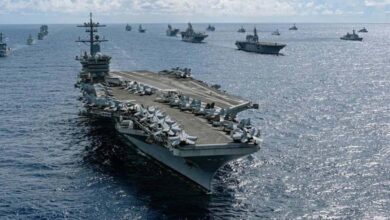Iran and Niger: Security Cooperation or Uranium Enchantment?

In the shifting geopolitical landscape of Africa’s Sahel region, Iran is emerging as an unconventional player, expanding its presence in Niger and seizing the opportunity left by Western disengagement.
While Tehran presents a seemingly benign security agreement, widespread doubts persist about its true ambitions — particularly regarding Niger’s uranium reserves, located in some of Africa’s richest subsoil, according to French magazine Le Point Afrique.
-
Using the Economy as a Tool of Infiltration… Al-Qaeda Expands in West Africa
-
Neutralization of several leaders of ISIS and Al-Qaeda organizations in Syria… Details
In early May, the arrival of an Iranian Falcon 20i police aircraft in Niamey did not go unnoticed. On board was a high-ranking security delegation led by Brigadier General Reza Radan, head of Iran’s internal security forces. The plane reportedly made a brief stopover in Burkina Faso, but the main event was the signing of a security protocol with Niger’s Ministry of the Interior, officially announced on May 8.
The agreement outlines increased security cooperation including intelligence sharing and training — a sign, according to Le Point Afrique, of converging interests between two states seeking to expand their geopolitical footprint.
-
The Free Circulation of Weapons and the Infiltration of Terrorist Elements Have Aggravated Terrorism in Africa
-
After a Decade, Why Did the United States Decide to Withdraw Its Troops from Niger?
In Search of New Partners
Since the July 2023 coup led by General Abdourahamane Tiani, Niger’s new regime has faced growing international isolation. Initially sanctioned by ECOWAS, these penalties were later lifted to avoid a humanitarian disaster.
By joining the Alliance of Sahel States alongside Mali and Burkina Faso, Niger further strained relations with neighbors like Nigeria and Benin.
Yet the most pressing crisis remains security-related. According to the 2025 Global Terrorism Index, Niger experienced the largest rise in terror-related deaths in 2024 — an increase of 451 fatalities.
-
Washington loses its strategic base for monitoring the coast and Libya with the withdrawal from Niger
-
Title: Provocative Step Allows Russian Soldiers to Enter US Base in Niger
With the withdrawal of French and U.S. troops, Niamey has turned to new security partners. A defense pact with Russia was signed in December 2023, with Moscow dispatching military trainers and members of the Africa Corps — widely considered the successor to the Wagner Group.
However, historian and Sahel expert Dr. Ladji Ouattara told Le Point that “this alliance has failed to deliver on its promises.” By contrast, he noted, “Iran possesses advanced drone technologies, which may appeal to Niamey after the U.S. withdrawal and the handover of Agadez Base 201, originally designed for drone operations.”
-
A French report warns of Iran’s infiltration in Africa… Details
-
What does Iran want from Mali? Details
A Nuclear Motive?
Many observers interpret the growing ties with Iran as a strategy to secure future access to Nigerien uranium.
Iran is currently the world’s seventh-largest uranium producer, according to the World Nuclear Association (2022 report). High-level visits, including Niger’s Prime Minister’s early 2024 trip to Tehran, suggest secret negotiations over uranium supply, the magazine reports.
-
A Mysterious Mission… A U.S. Spy Plane Over Cartel Territory
-
2025… How Do Americans View the New Year?
The recent security agreement reinforces this theory. Dr. Ouattara asserts that “Iran is highly pragmatic in its foreign relations, and uranium is clearly a major factor in this cooperation.”
Niger’s economy, for its part, is experiencing a paradox. While GDP growth is projected to reach nearly 10% in 2024, political isolation has stifled foreign investment.
According to the IMF, Niger is currently reevaluating its natural resource exploitation policy. Prior to the coup, uranium exports accounted for over 15% of GDP. Today, a legal dispute with French company Orano (formerly Areva) is disrupting the sector.
-
Taming the Dragon? Washington Approves Sale of Offensive Weapons to Taiwan
-
The Growing Jihadist Violence in the Sahel
Frozen Uranium
Despite operating three subsidiaries in Niger, Orano announced in December 2024 that it had lost control over its activities due to escalating tensions with the regime.
Authorities suspended the Imouraren mine exploitation license, prompting Orano to file two international arbitration cases against the Nigerien state. On May 6, the company expressed concern over searches at its premises and the loss of contact with its local representative.
Practically speaking, around 1,300 tons of uranium remain frozen, awaiting uncertain export clearance, according to Le Point.
-
Report: Al-Qaeda reorganizes its ranks in Afghanistan through secret efforts… How?
-
Washington plans to establish bases for drones in African countries… Why?
The Financial Times reported on May 17 that Orano’s assets in Niger may be up for sale. Russian and Chinese interests, a Cyprus-registered firm, and even the Nigerien government are potential buyers.
This restructuring of Niger’s uranium market may pave the way for deeper Iranian involvement. Tehran could intensify its security support to Niamey in exchange for strategic benefits — a “transaction” that is raising alarm in Western capitals, Le Point Afrique concludes.












